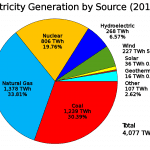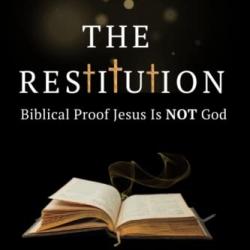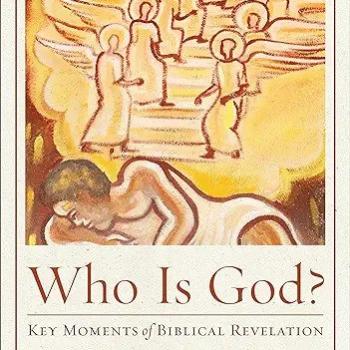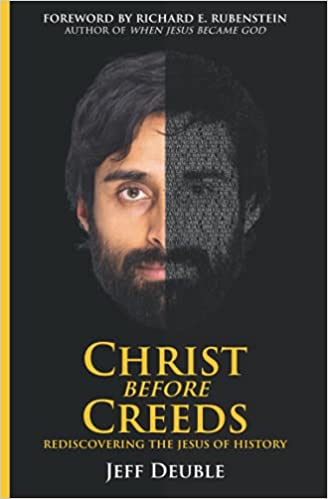 Jeff Deuble is the author of the recent book, Christ Before Creeds: Rediscovering the Jesus of History. It is a 176-page book about Jesus’ identity published by Living Hope International Ministries in 2021. I don’t know Jeff personally. I was asked to read and blurb his book because of its similarity to my book, The Restitution of Jesus Christ (2008). I am happy to oblige.
Jeff Deuble is the author of the recent book, Christ Before Creeds: Rediscovering the Jesus of History. It is a 176-page book about Jesus’ identity published by Living Hope International Ministries in 2021. I don’t know Jeff personally. I was asked to read and blurb his book because of its similarity to my book, The Restitution of Jesus Christ (2008). I am happy to oblige.
Jeff was a pastor for many years in the Churches of Christ denomination in Australia. He had a similar experience as I did in which he had been a Trinitarian Christian for decades. Then his brother challenged him to rethink his belief that Jesus is God and that God is three persons. For an average churchman to do this takes courage; for a pastor to do it may mean the end of his job. How so? For sixteen centuries now, the institutional church has declared that anyone who does not believe the doctrine of the Trinity, and thus that Jesus is both God and man, is not a Christian.
Dr. Richard E. Rubenstein of George Mason University has written the foreword in this book. I cite him in my Restitution book due to his important book, When Jesus Became God. Some Christian readers might object to this foreword since Rubenstein is Jewish and not Christian. But he writes that due to his book, “I had the opportunity to speak in many Christian churches and discovered, to my surprise, that controversy about the Trinity was very much alive” even in Trinitarian churches. He rightly says of Deuble’s book, “the author makes several points that seem difficult, if not impossible, to refute. To begin with, he states correctly that the belief that Jesus was God . . . was an innovation that took almost four centuries to establish . . . Christian leaders turned away from their (and Jesus’s) Hebrew roots in order to embrace a concept of the Godhead rooted in Greek philosophical traditions rather than Scriptures.”
In Chapter 1, Deuble briefly explains the doctrine of the Trinity and Unitarianism. He says, “I remember how defensive, upset, and angry I was when I first encountered a Non-trinitarian view that challenged ‘my Jesus’” (p. 14). He explains that in this book, “I do not want to comprehensively deal with every issue or passage of Scripture. There is a lot more depth and detail behind what is discussed here” (15). So, this book is an introduction to this vital subject.
I only disagree with two matters in this book, both being semantical issues. Jeff says three times in this chapter that Jesus is “divine” (19-20, also 113). He appeals to its Latin derivation, which can mean, “simply to be like God.” Indeed, but in biblical scholarship, calling Jesus divine is usually equated with calling him God. Both Jeff and I stress that there is a huge difference between Jesus being like God, which we both strongly affirm, and Jesus being God.
In Chapter 2, Jeff tells about his change of belief in Jesus’ identity. And he stresses the importance of getting this subject right—as to whether or not Jesus is God and God is triune. Like me, Jeff is strongly committed to knowing the truth about God and Jesus despite rejection by Christians. And we do not think that people who believe Jesus is God and God is triune are not Christians. After all, both Jeff and I believed that way for decades, and we are absolutely convinced in our hearts that we were born-again Christians. In other words, Jeff and I do not think this subject has anything to do with Christian conversion. Rather, we believe that being a Christian is about truly believing in Jesus Christ as Savior and making him Lord of our lives.
In Chapter 3, Deuble presents some brief explanation and history of the earliest church creeds. He thereby shows the development of thought about the identity of Jesus and God. Jeff rightly states that by the time of the Constantinople Creed of 381, “Jesus was considered to be co-eternal, co-equal, and co-essential with the Father” (45). Jeff then deals at some length with the common assertion of Trinitarians that their doctrine is a mystery that cannot be fathomed, yet must be accepted. He well says of it, “This claim is something of a non sequitur” (46). Jeff then makes an extremely important point about the New Testament that Trinitarians gloss over at their own peril. He states concerning the early Christians, “They didn’t shy away from controversies and potential points of friction. . . . Of all the conflicts between Christianity and traditional Judaism, this would have been the biggest of all, overshadowing everything else by far. Any attempt to dismantle or redefine strict monotheism would have been bitterly fought by the Jewish believers. Yet there is no mention of such a controversy anywhere” in the New Testament (49).
The Aussie author continues, “If all Trinitarians were to admit that their theological construct was a later development, subsequent to the New Testament writings, then this silence would be understandable. But many advocate that Trinitarian doctrine was inherent within the Christian faith from the very inception of the church, and that the Gospel writers and apostles bear witness to it” (49). Yes, and they don’t. The word Trinity isn’t even in the Bible. And nowhere in the gospel sayings of Jesus does he ever expressly claim to be God. Plus, the most distinguished Trinitarian scholars usually admit their doctrine was a later development. Jeff and I believe that is adding to the Scriptures, which they forbid (e.g., Deuteronomy 4.2).
In Chapter 4, “What Went Wrong?,” Jeff explains how church fathers went astray. As Christianity transitioned—from consisting mostly of Jews to almost entirely Gentiles—and then it spread throughout the Roman Empire, it became influenced somewhat by Greek philosophy.
Jeff says that as a pastor, “My doctrinal transition was a paradigm shift, and I experienced the inherent resistance that comes with such a crisis. . . . The turning point from this impasse came when one day I decided to read the New Testament, not through my usual ‘Trinitarian lens,’ but a traditional monotheistic and Jewish one, where the man Jesus was the Messiah, the Son of God, but not himself God.
“I was amazed at how much more simply and clearly it read. There was no need to engage in internal mental gymnastics in order for the text to make sense. This new paradigm was exegetically and theologically a better fit” (71-72).
In Chapter 5, “What Does the Bible Teach?,” Jeff emphasizes from the Old Testament that the name of God, which is Yahweh (YHWH), indicates that God is a single being. And he rightly says the biblical expression “Son of God,” as applied to Jesus, is a messianic title that does not mean he is God since it is applied to others in the Bible, though to Jesus in a special sense. Jeff cites 1 John 4.12—“no one has ever seen God”—as evidence that Jesus is not God.
In Chapter 6, “Who Is Jesus?,” Jeff argues from scripture the uniqueness and sinlessness of Jesus, yet also his being tempted as we are, showing he cannot be God. For Jesus’ brother James declares, “God cannot be tempted by evil” (James 1.13). This is when Trinitarians pose their unscriptural construct “the hypostatic union of Christ,” claiming that Jesus was tempted in his human nature but not in his divine nature. But this idea that Jesus had two natures, a human nature and a divine nature, does not appear anywhere in the New Testament. Jeff and I both believed it, like all Trinitarians do, simply because it was created by church fathers in the 4th century and taught to us. Jeff further counters, “In evangelical circles we focus almost exclusively on ‘faith in Jesus,’ but the Scriptures also talk about the ‘faith of Jesus’” (111). Indeed, it was because of Jesus’ faith in God that he was able to overcome sin.
Herein, Jeff also addresses the common argument posed by Trinitarians in which they assert, “Jesus had to be God to save us” (115). That is not true; the Bible never says that. Rather, this axiom was set forth by church father Athanasius who was so hostile to Arians in his defense of the Nicene Creed. Moreover, this concept of deity originates from Greek philosophy.
Jeff gets personal again by saying, “When I considered the Non-trinitarian perspective, I found that I no longer had to struggle with anomalies and inconsistencies in logic; no longer had to perform exegetical backflips; no longer had to ignore or explain away certain verses that didn’t fit the paradigm. The Bible just started making a whole lot more sense” (119).
Jeff continues, “I can appreciate that many Christians cannot contemplate the thought that Jesus is anything other than fully God. It’s how they were brought up in Christian faith. . . . It may seem like anything other than that perception is unacceptable and would amount to a denial of their faith in Christ or a reduction of his status.
“That’s where I stood for many years. But ultimately what was more important to me than my Christian heritage, what I thought, or how I felt, was what the Bible says. What do the Scriptures teach? What has Jesus declared, and what has God revealed?” (121-22). Right on!
Deuble concludes, “The Bible teaches that this Jesus came in flesh as a human being. He was born and lived as a man: completely human. He is not a Gnostic or Trinitarian Jesus with a composite nature, . . . Such a Jesus would not be genuinely and authentically human” (125). Indeed, the author of Hebrews negates the notion of a divine-human Jesus by saying, “he had to become like his brothers and sisters in every respect” (Hebrews 2.17). Neither possessing a divine nature nor eternally preexisting is compatible with being fully human.
In the final chapter 7, “What’s Essential,” Deuble addresses a subject that was of keen focus in his ecclesiastical tradition. (My mother was a member of The Christian Church which separated from the Churches of Christ.) He relates that his church denomination tried to focus on the essentials of Christian faith to achieve unity among its members (129).
Jeff then cites the dictum to which the Churches of Christ have subscribed and I have too nearly all of my adult life concerning Christian faith—“In essentials unity, in non-essentials liberty, in all things charity (love)” (130). Jeff truly says again, “The focus of the New Testament is in Jesus as the Christ, the Messiah. There is no call anywhere for anyone to believe that he is God” (136). Jeff then concludes this chapter by calling for all Christians to investigate this subject while adhering to the apostle Paul’s admonition, “speak the truth in love (Eph. 4:15)” in order to “maintain genuine love, mutual respect, and Christian unity” (142).
Deuble explains early in this book concerning the main biblical texts that Trinitarians cite to support their doctrine, “I have decided to not include discussion around some of the more contentious passages in the main text, as it can get a little complicated or confusing. Instead, I have put this material in Appendix A” (15). Yet these pages (143-172) only scratch the surface. Those foremost texts are John 1.1; 18; 10.30-38; 20.28; Romans 9.5; Philippians 2.6-7; 2 Thessalonians 1.12; Titus 2.13; Hebrews 1.8-10; 2 Peter 1.1; John 5.20. And the major texts that Jeff and I would cite to support our position include John 17.3; Mark 12.29-32; Acts 2.22; 1 Corinthians 8.6; Ephesians 4.4-6.
My only other objection to Jeff’s book concerns his brief comment on John 20.28 in Chapter 4. He mentions “John 20:28, when Thomas declares to the resurrected Christ, ‘My Lord and my God!’ In what sense is he using these titles? . . . . Jesus is only clearly called ‘God’ twice in the whole New Testament (John 20:28; Heb. 1:8)” (65). Yet in Jeff’s treatment of John 20:28 in his Appendix (157-161) he says, “it seems highly improbable that Thomas is conferring deity upon Jesus” (158). Yes, but saying Thomas calls Jesus “God” muddies the water for me in our mutual effort to distinguish between the two beliefs that Jesus is God and God is merely in Jesus.
The best work I’ve done in my Restitution book is about Thomas’ Confession. By the time it was published, in 2008, I had not discovered any Johannine scholars who interpreted it as I did. I state in the book, “Thomas’ words to Jesus, ‘My Lord and my God,’ have been exceedingly misunderstood” (385). I continue, “The key to unlocking the true understanding of Thomas’ words ‘my God’ in Jn 20.28 is found in what Jesus said earlier to Thomas, in Jn 14.7, ‘If you had known Me, you would have known My Father also; from now on you know Him, and have seen Him.’ And Jesus restates more precisely in v. 9, ‘He who has seen Me has seen the Father’” (393).
I then add, “Thomas’ Confession thus indicates more than a mere recognition that God raised Jesus from the dead. Rather, Thomas’ words ‘my God’ also indicate that this previously doubting apostle now understands what Jesus had taught ten days earlier, that God the Father fully indwells, and therefore completely permeates, the life of Jesus. Thus, the Father is spiritually seen, that is, comprehended, in Jesus Christ. So, Thomas’ words ‘my God,’ while addressed to Jesus, represent a faith response to the God who revealed Himself to Thomas in the risen Jesus” (394). And all of these italics are in my book.
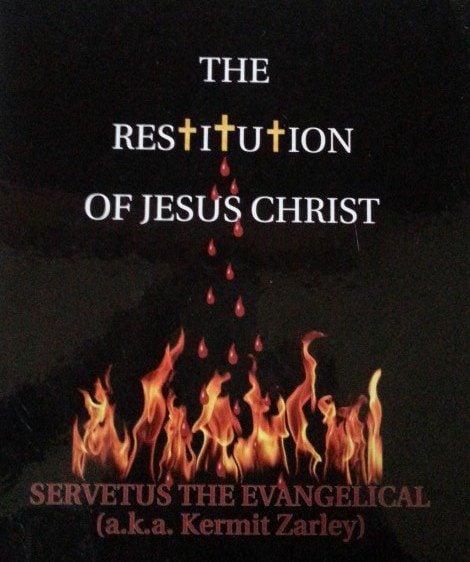 Despite these two rather semantical differences, I admire Jeff Deuble’s irenic style in how he writes about what can be a divisive subject among Christians. So, I highly recommend his lucid book, Christ Before Creeds: Rediscovering the Jesus of History. It is an excellent introduction to this vital subject–the identity of God and Jesus. And I think it is a good primer for those who may want to afterwards dig more deeply into the critical texts of Scripture by reading my 600-page book, The Restitution of Jesus Christ, and especially to have it in one’s library as a reference book.
Despite these two rather semantical differences, I admire Jeff Deuble’s irenic style in how he writes about what can be a divisive subject among Christians. So, I highly recommend his lucid book, Christ Before Creeds: Rediscovering the Jesus of History. It is an excellent introduction to this vital subject–the identity of God and Jesus. And I think it is a good primer for those who may want to afterwards dig more deeply into the critical texts of Scripture by reading my 600-page book, The Restitution of Jesus Christ, and especially to have it in one’s library as a reference book.


